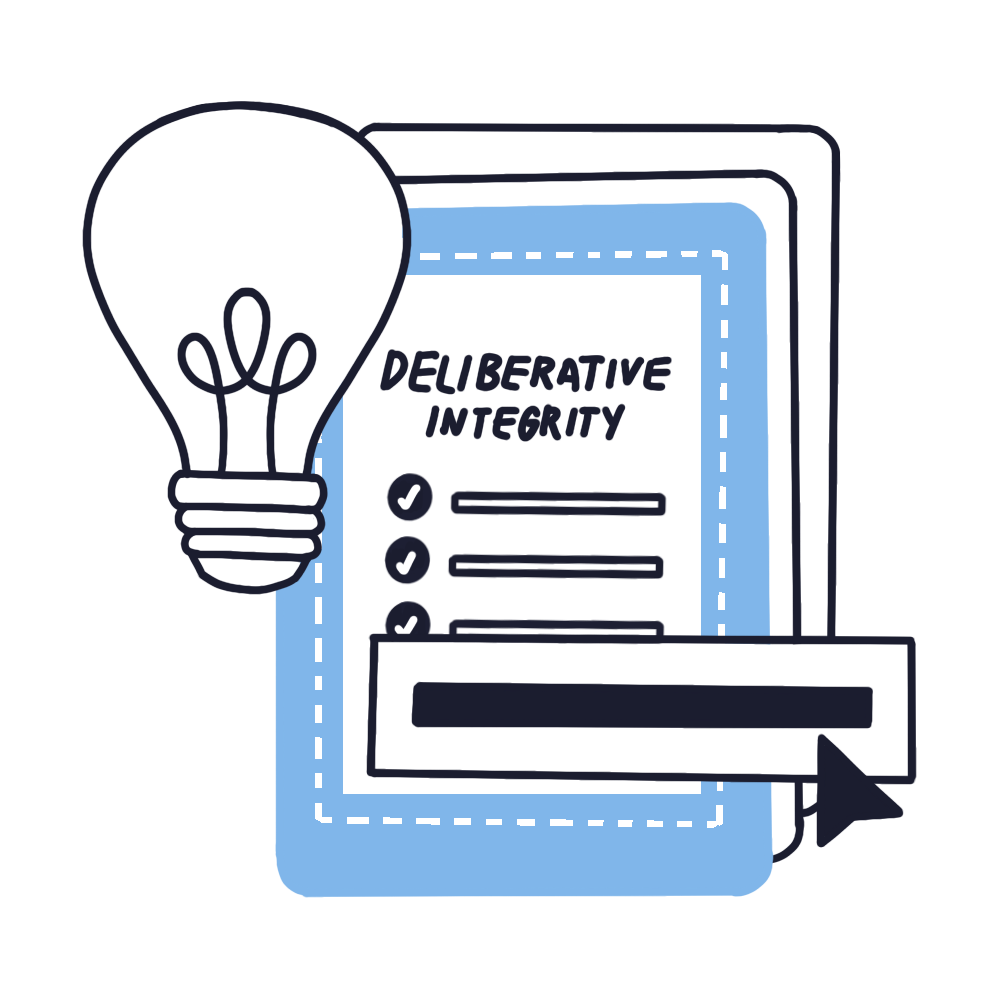Defining
Deliberative
Integrity
Integrity is a critical part of democratic governance.
Election monitors have been deployed to ensure that elections are free, fair, and competitive. Monitory institutions or watchdog bodies have been institutionalized to scrutinize abuses of power. In the field of democratic innovations, however, discussions about integrity of innovative forms of citizen participation have yet to be mainstreamed. While there have been advanced discussions about what makes high quality processes, more can be done in discussing what it means to convene a deliberative process with the highest standards of integrity. This is timely considering the growing popularity of deliberative processes. As the field of practice takes steps towards the mainstream, greater resources and higher political stakes are put into them. This increases their vulnerability to abuses of power.
How can we convene a deliberative process with the highest standards of integrity?
The Deliberative Integrity Project aims to foster a critical, reflective, and scholarly dialogue on the following questions.
- What makes an ‘ethical’ deliberative process?
- What does the ethical governance of deliberative mini-publics look like?
- What is the conceptual distinction between integrity, quality, ethics, and others?
- What risks do democratic innovations face when it comes to upholding ethical standards of conduct?
- How do the different actors involved in the practice of deliberative mini-publics understand and apply the concept of deliberative integrity?
- How do these actors currently deal with ethical issues on the ground? What can we learn from these experiences?
- How do we assess or measure the integrity of democratic innovations?
- Should there be mechanisms of standardizing or monitoring the integrity of democratic innovations? If so, what might this look like in practice?
- What are the roles of watchdogs such as the media and civil society groups, as well as supervisory and regulatory authorities, in upholding integrity in democratic innovations?
Why we need to
discuss integrity
now

As the use of deliberative processes or ‘mini-publics’ increases, so too do potential threats to their integrity.
First, the uptick in popular process designs such as citizens’ assemblies can lead to participation being instrumentalised to achieve a predetermined outcome, with the process serving merely as a ‘grand spectacle’ at best and being open to covert manipulation and corruption at worst.
Second, the commercialisation and professionalization of the public participation industry means that the organisation of deliberative processes dictates a tricky landscape between commercial and democratic interests.
Finally, both points mean that deliberative mini-publics could be condemned to the toolkit and become a commodified off-the-shelf, ill-fitting solution applied without consideration of local context and purpose.
The legitimacy and credibility of deliberative processes are at stake.
Underpinning these challenges is the point that across the diverse applications of deliberative mini-publics, there is no single set of criteria for their evaluation. Many have focussed on participant experiences within the deliberative and to a lesser extent, have also included a focus on outcomes. Both process and outcome evaluations undoubtedly hold valuable insights on integrity, but for the most part are concerned with the quality of the process – which is not synonymous with integrity. This conceptual distinction – between integrity and quality – requires further development. Simply put, the legitimacy and credibility of deliberative processes are at stake.

At the end of this
project, we aim to:
Publish a report as well as academic publications that sets out what deliberative integrity means, grounded on reflective empirical research, in collaboration with academics, practitioners, policymakers, advocates and critics of deliberative democracy.
A series of roundtables that facilitate a global conversation on deliberative integrity.
Generate further collaboration with key stakeholders to promote deliberative integrity.